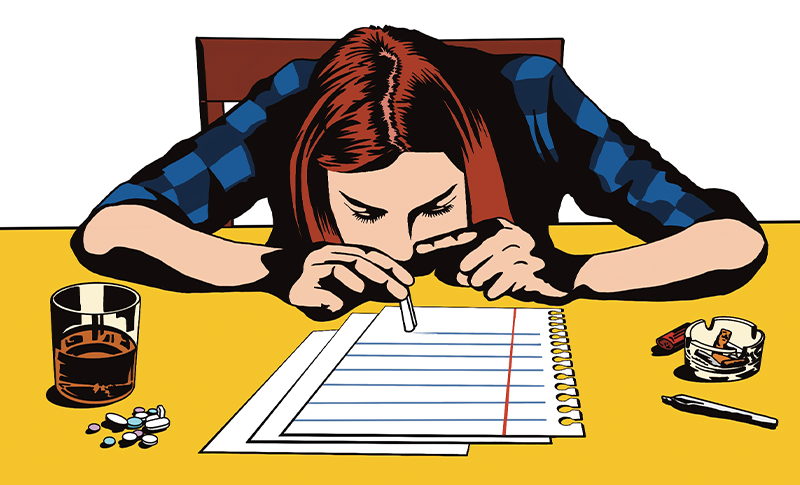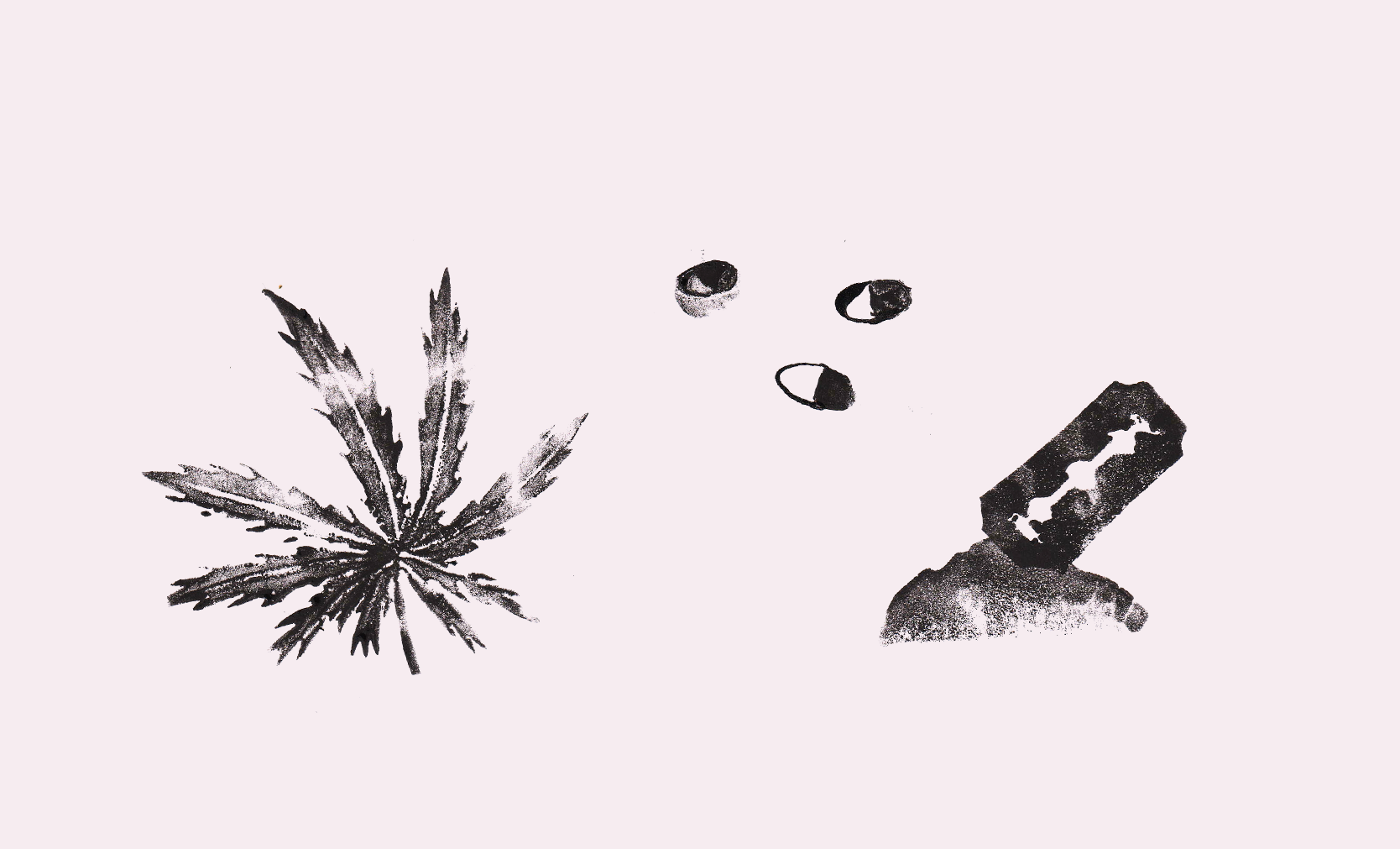Since the Covid-19 pandemic and the accompanying lockdowns, drugs use is said to be booming among students. There have been articles on this in various media, Utrecht student societies organized a symposium about it, and WUR rector Arthur Mol expressed his concerns about the ‘increasing use of stimulants among students’. But is it actually true? And what is the situation in Wageningen?
Where does the perception that students are using ever more drugs come from? This impression appears to come largely from students’ experiences and stories, as well as signals picked up by people supporting them. There are very few hard figures on drug use among students. In spring 2021, the research institute Trimbos and health organizations RIVM and GGD GHOR ran a survey on wellbeing and substance use among higher education students. This survey was filled in by more than 28,000 students from across the country and covered alcohol, drugs, tobacco and gaming. It also asked about stress, pressure to perform, and mental health. You can see some of the results in the table below. The results were not broken down by educational institution.
| Used in past | Used in past year | Used in past months | |
| Drugs | Percentage | Percentage | Percentage |
| Cannabis (hashish, marijuana) | 53.2 | 33.5 | 16.8 |
| Nitrous oxide | 28.3 | 8.9 | 1.5 |
| Ecstacy/MDMA | 22.5 | 13.2 | 3.3 |
| Magic mushrooms | 13.7 | 6.7 | 1.0 |
| Cocaine | 12.2 | 7.4 | 2.5 |
| Ketamine | 9.4 | 5.8 | 1.8 |
| 2C-B | 8.6 | 5.2 | 1.1 |
| LSD | 5.1 | 2.3 | 0.4 |
| 4-Fluoramphetamine (4-FA, 4-FMP) | 3,5 | 0.8 | 0.1 |
| GHB or GBL | 1,9 | 0.5 | 0.1 |
‘It is the first time we have conducted this study among students only,’ says Michelle van der Horst, a scientist at Trimbos, in an interview on Teams. ‘So we can’t say anything about changes in drug use among students. This survey is a starting point and we want to do it every other year from now on.’ Van der Horst has another disclaimer besides this. ‘The survey was done during the third lockdown. Certain substances are very setting-specific. For instance, ecstasy is used a lot at festivals and not so much at home. Students also reported smoking more cannabis than usual. So we expect to see some differences in follow-up research results.’
Stronger stuff
According to the Utrecht students who organized the symposium, many of their fellow students had started using more drugs during the lockdowns. Was it the same for Wageningen students? Resource spoke to three students from different scenes. ‘My impression is that before Covid, people mainly used weed, drank a bit and maybe took something else at a special party,’ says a Master’s student of Plant Sciences who prefers to remain anonymous. ‘Now I notice at parties that there’s often someone who has some stronger stuff with them. For example, I was at a party not long ago where ketamine was suddenly being passed around. And people were already drunk. I get the impression that people tried things with friends during the lockdowns and that has lowered the bar for taking other drugs.’
I notice at parties that someone often has stronger stuff with them
Levi Altenburg, a student of Landscape Architecture and Planning, thinks the secret house parties during the lockdowns changed things, too. ‘As a result, I think more people started taking drugs at home, rather than only on special occasions. The threshold for using drugs has lowered as a result. And I think people influence each other. When stories go around about a party where “everyone is going to do pills”, people might think: I’d better join in.’
Yet not everyone sees it this way. ‘In my circle, I think drug use has actually decreased since the lockdowns,’ says a Master’s student of Nutrition and Health who wishes to remain anonymous. ‘But that could also be because we are all getting a bit older. I used to do drugs sometimes, but in the past few years it’s gone down a lot. There’s a bit of it at parties. Maybe it has become more normal, and less furtive.’
Normalization
Levi Altenburg, a student of Landscape Architecture and Planning, thinks the secret house parties during the lockdowns changed things, too. ‘As a result, I think more people started taking drugs at home, rather than only on special occasions. The threshold for using drugs has lowered as a result. And I think people influence each other. When stories go around about a party where “everyone is going to do pills”, people might think: I’d better join in.’
Yet not everyone sees it this way. ‘In my circle, I think drug use has actually decreased since the lockdowns,’ says a Master’s student of Nutrition and Health who wishes to remain anonymous. ‘But that could also be because we are all getting a bit older. I used to do drugs sometimes, but in the past few years it’s gone down a lot. There’s a bit of it at parties. Maybe it has become more normal, and less furtive.’
If you start publishing articles about drug normalization, you normalize drugs
Concerns
So it’s hard to say whether Rector Mol should be worried about the increasing use of stimulants. Do the currently available figures give cause for concern? Van der Horst: ‘First of all: drug use is never risk-free. Full stop. And if you do drugs, make sure you’re well-informed. Look on a website like Drugs en uitgaan (Drugs and going out). What worries me most is that some students say they can’t do without drugs. It doesn’t matter which substance it is. For example, some students say they need a joint to get to sleep. At that point, their drug use ceases to be just social and becomes worrying. In such cases, it is good to think about why you are doing it. If something becomes a habit, then you have to be careful.’
And one typically habitual drug is, of course, alcohol. ‘In many student houses, alcohol is always present, and is actually almost always drunk at and after dinner. The health council’s advice is: don’t drink, and if you drink, stick to a maximum of one glass a day. If you look at the figures among students, that’s obviously an issue.’
11 per cent drink excessively (more than 21 glasses a week for men and more than 14 glasses a week for women), 16 per cent are heavy drinkers (for men, drinking 6 or more glasses, for women, 4 or more glasses on one day at least once a week), and 40 per cent say it is acceptable among their close friends to drink 10 or more glasses of alcohol in one evening.
Student Levi sees this all around him. ‘The amount of booze consumed by students is truly bizarre. And in that I include student societies and student houses where there are traditions around drinking vast amounts. And yes, I do enjoy it myself now and then. But it can’t be healthy.’
The amount of booze consumed by students is truly bizarre
Integral approach
What is the university’s role when it comes to alcohol and drug use? Van der Horst: ‘We know from scientific research that it is not enough just to provide education and awareness-raising, but that you need to get people involved. This could include student societies, sports clubs, teachers, student counsellors , and so on. That is partly why more and more educational institutions have policies around alcohol and drugs. And not just to ban drug use, but also to set up a good care system. So that when a teacher notices that someone is always very tired – which can be for all sorts of reasons, of course – they know where to go for information. Or that if a student says they can’t keep up with their studies, the student psychologist asks about substance use.’
Drug policy among student societies
Drug use is prohibited at Ceres, KSV, SSR-W and Unitas. Members caught in possession of drugs, or dealing or taking them, must leave the premises. Depending on the seriousness of the situation, this will be followed by a warning, a fixed-term suspension or even expulsion.
The four clubs do confirm the impression that more drugs were used during the lockdowns, out of boredom and because there were more unsupervised parties in student houses. But all the societies state that they reckon drug use has now gone back to pre-Covid levels.

 Illustration: Valerie Geelen
Illustration: Valerie Geelen 

